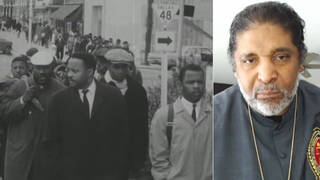
By Amy Goodman & Denis Moynihan
Martin Luther King Jr. would have turned 89 years old this Jan. 15. Assassinated at the age of 39 on April 4, 1968, his much-too-short life forever changed America. Among the landmarks of his activism are the 1955 Montgomery bus boycott, ending segregation in public transportation; leading the 1963 March on Washington, where he delivered his famous “I Have a Dream” speech; the passage of the 1964 Civil Rights Act and the 1965 Voting Rights Act; and marching with sanitation workers in Memphis, where he declared in his last speech, delivered on the eve of his death, “I’ve been to the mountaintop.” Often overlooked are the increasingly radical policy positions King took in his last years, from speaking out against the Vietnam War to forging a multiracial Poor People’s Campaign that sought, as King said, “a radical redistribution of economic and political power.” Now, 50 years later, a coalition has formed anew to organize poor people in the United States into what King called “a new and unsettling force” to fight poverty and forge meaningful change.
This renewal, called “The Poor People’s Campaign: A National Call for Moral Revival,” has an audacious agenda: “to challenge the evils of systemic racism, poverty, the war economy, ecological devastation and the nation’s distorted morality.” At the forefront is the Rev. Dr. William J. Barber II. Born just two days after the famous March on Washington, Barber grew up in the civil-rights movement. For over 10 years he served as president of the North Carolina NAACP, stepping down to lead this new campaign.
Back in 1968, King described the need for the Poor People’s Campaign, saying: “Millions of young people grow up in the sunlight of opportunity. But there is another America. And this other America has a daily ugliness about it that transforms ebulliency of hope into the fatigue of despair.”
Speaking this week on the “Democracy Now!” news hour, Rev. Barber reflected on how little has truly changed since King’s time: “Fifty years later, we have nearly 100 million poor and working poor people in this country, 14 million poor children. … Fifty years later, we have less voting rights protection than we had on August 6, 1965,” he said. “[Republicans] have filibustered fixing the Voting Rights Act now for over four years, over 1,700 days.”
“Every state where there’s high voter suppression,” Barber continued, “also has high poverty, denial of health care, denial of living wages, denial of labor union rights, attacks on immigrants, attacks on women.”
Barber says the answer is fusion politics: “We have black, we have white, we have brown, young, old, gay, straight, Jewish, Muslim, Christians, people of faith, people not of faith, who are coming together,” creating what he calls the “Third Reconstruction.” Part of this fusion includes reaching out to traditionally conservative Christians, like Minister Jonathan Wilson-Hartgrove. From a devout, white evangelical family, as a teen he served as a congressional page under South Carolina Republican Sen. Strom Thurmond, one of the fiercest segregationists of the modern era.
Wilson-Hartgrove heard William Barber preach, and has been a follower and a colleague ever since. The renewed Poor People’s Campaign is responding to poor, white evangelicals, Wilson-Hartgrove says: “These people who say, ‘Vote for me because I’m a good Christian leader’ are not serving your interests. You don’t have health care, you don’t have a living wage, because the same people who say they’re standing up for God and righteousness are, when they’re voting, voting against the interests of poor people, whether you’re black, white, brown or whatever.”
Barber sees transformation of the Deep South on the near horizon, but doesn’t claim it will be easy. Recent court victories against both racial and political gerrymandering in North Carolina will further empower African-Americans and other traditionally marginalized groups. But the real work will be done not in the courts, but in the streets.
Barber and Wilson-Hartgrove, along with the Rev. Liz Theoharis, co-director of the New York City-based Kairos Center for Religions, Rights, and Social Justice and co-chair of the modern-day Poor People’s Campaign, traveled to 15 states around the country in recent months, recruiting, organizing and training over 1,000 people. Barber said: “Our first action will be on the Monday after Mother’s Day. We’re going after 25,000 people engaging in civil disobedience over six weeks to launch a movement.” Their target: the U.S. Capitol and statehouses across the country.
Martin Luther King Jr. was robbed of life by a sniper’s bullet 50 years ago. But on this anniversary of his birth, this national holiday that people fought decades for, his vital work to empower the poor, lives on.












Media Options